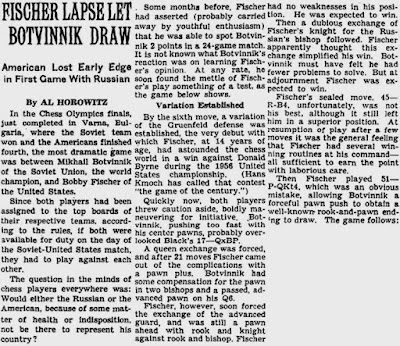New York Times, New York, New York, Friday, October 12, 1962 - Page 28
Fischer Lapse Let Botvinnik Draw
American Lost Early Edge in First Game With Russian
In the Chess Olympics finals, just completed in Varna, Bulgaria, where the Soviet team won and the Americans finished fourth, the most dramatic game was between Mikhail Botvinnik of the Soviet Union, the world champion, and Bobby Fischer of the United States.
Since both players had been assigned to the top boards of their respective teams, according to the rules, if both were available for duty on the day of the Soviet-United States match, they had to play against each other.
The question in the inds of chess players everywhere was: Would either the Russian or the American, because of some matter of health or indisposition, not be there to represent his country?
Some months before, Fischer had asserted (probably carried away by youthful enthusiasm) that he was able to spot Botvinnik 2 points in a 24-game match. It is not known what Botvinnik's reaction was on learning Fischer's opinion. At any rate, he soon found the mettle of Fischer's play something of a test, as the game below shows.
Variation Established
By the sixth move, a variation of the Gruenfeld defense was established, the very debut with which Fischer, at 14 years of age, had astounded the chess world in a win against Donald Byrne during the 1956 United States championship. (Hans Kmoch has called that contest “the game of the century.”)
Quickly now, both players threw caution aside, boldly maneuvering for initiative. Botvinnik, pushing too fast with his center pawns, probably overlooked Black's 17—QxBP.
A queen exchange was forced, and after 21 moves Fischer came out of the complications with a pawn plus. Botvinnik had some compensation for the pawn in two bishops and a passed, advanced pawn on his Q6.
Fischer, however, soon forced the exchange of the advanced guard, and was still a pawn ahead with rook and knight against rook and bishop. Fischer had no weaknesses in his position. He was expected to win.
Then a dubious exchange of Fischer's knight for the Russian's bishop followed. Fischer apparently thought this exchange simplified his win. Botvinnik must have felt he had fewer problems to solve. But at adjournment Fischer was expected to win.
Fischer's sealed move, 45—R-B4, unfortunately, was not his best, although it still left him in a superior position. At resumption of play after a few moves it was the general feeling that Fischer has several winning routines at his command—all sufficient to earn the point with laborious care.
Then Fischer played 51—P-QKt4, which was an obvious mistake, allowing Botvinnik a forceful pawn push to obtain a well-known rook-and-pawn ending to draw. The game follows:























